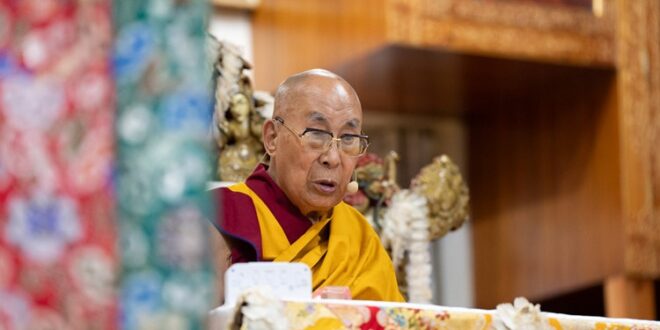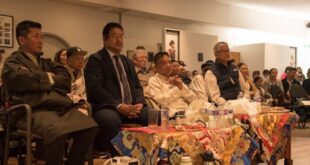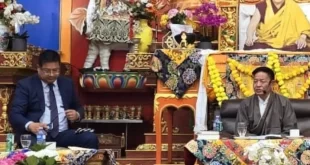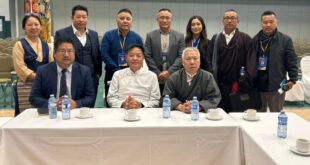Dharamshala: After His Holiness the Dalai Lama arrived in the Thekchen Chöling Tsuglagkhang on 4 June 2024 this morning, the second session of teachings for young Tibetans opened with the recitation of a verse of admiration for His Holiness and his accomplishments.
Next, members of the Introduction to Buddhism Course, adult women and men, engaged in an energetic demonstration of their debating skills. They discussed points of Tibetan grammar, as laid out in Thönmi Sambhota’s treatise known as ‘Sum-chu-pa’.
His Holiness then addressed the gathering:
“Today, although we are in exile, whether young or old, we take an interest in education. The mature students who have just debated before us have demonstrated their enthusiasm for education. In the monastic centres of learning such as Sera, Ganden and Drepung, monks have long studied and engaged in debate on the Nalanda model. Now laypeople are taking an interest in this approach as well. This all contributes to keeping our traditions alive. Students are also learning to debate at school. It seems we’re all involved.
“There are growing numbers of Chinese who are interested in learning more about Tibetan Buddhism. We should think about how we can help them. A key point to note is that our tradition is not only about prayers and rituals, it involves rigorous study and debate. Sharing these skills is how we can help interested Chinese uphold the Buddhadharma in study and practice.
“There are also people in other parts of the world where Buddhism was previously little known who are now taking an interest in what our traditions have to say about the workings of the mind and emotions, and so forth. I believe we have a responsibility to contribute to the good of the world by sharing what we know. I appreciate the example of debate that we’ve seen today.
“Among the refugee communities of the world, Tibetans are among the most successful in terms of keeping our spiritual traditions and culture alive. We should continue to make efforts in this direction.”
While the crowd enjoyed tea and bread His Holiness remarked that despite his age he has not lost a single tooth. He also mentioned a vivid dream he’d had of Palden Lhamo seated on his shoulders predicting that he would live to be 110 years old—the congregation applauded.
“What is most important,” His Holiness vouchsafed, “is the strong spiritual bond between us. I pray for everyone from the very moment I wake up. I pray that everyone should feel at ease.”
Taking up the ‘Key to the Middle Way’ once more, His Holiness spoke about the emptiness of body and mind. The body, he said, is a composite of different parts on the basis of which it is labelled—‘body’. The world too is a composite of different factors without which there would be no world. Things are dependently designated on the basis of their parts.
A person is designated on the basis of his or her body and mind. Without them there is no person. We all have a sense that ‘I am’; a notion of a self independent of body and mind; but there is no such self. To appreciate this, it is important to understand what is taught in the classic treatises.
“Examine yourself from the crown of your head to the tips of your toes,” His Holiness advised. “Ask yourself, Who am I? Where am I? Where is the person I think I am? Of course, when you try to dissect the different parts of your body and mind, you won’t find a person among them, but that doesn’t mean the person just doesn’t exist.
“A person exists only by way of designation on the basis of its parts. It’s important to realise that it’s only when body and mind come together that we can designate a person. Whatever appears to our mind seems to have a fixed, solid entity, an essential existence in and of itself, but that is not the case.
“When I meditate on emptiness, which I do every day, I recognise that it loosens the grip of the misapprehension of myself as an independent entity. Maybe that’s enough for me to say today.
“We are all happily gathered here and I would like to conduct the ceremony for granting the bodhisattva vows. Having a warm heart is a source of happiness. It involves being determined to help other sentient beings. It brings peace of mind, which is good for our physical well-being too.
“Today, I’m like a spokesman for the Buddhas and Bodhisattvas. Imagine them in the space before you. Recall that you have been born in a place where the Buddhadharma is alive and resolve that you will generate a warm-hearted attitude towards all sentient beings. Be an example to others.
“As soon as I wake up in the morning, I think about how I can fulfil the aims of others and myself. I generate the awakening mind of bodhichitta.
“Now, I’ll recite the relevant verses, you please repeat them after me.
I seek refuge in the Three Jewels;
Each and every wrongdoing I confess.
I rejoice in the virtues of all beings.
I take to heart the state of Buddhahood.
I go for refuge until I am enlightened
To the Buddha, the Dharma, and the Supreme Assembly,
In order to fulfil the aims of myself and others
I develop the awakening mind.
Having developed the aspiration for highest enlightenment,
I invite all sentient beings as my guests,
I shall enact the delightful supreme enlightening practices.
May I become a Buddha to benefit all sentient beings.
“As I’ve said, I reflect on bodhichitta daily. This is the best medicine for all ailments. My Dharma friends, keep bodhichitta in your hearts.”
A thanksgiving mandala was offered by a number of senior TCV officials and the session concluded with a recitation of the ‘Words of Truth’.
His Holiness the Dalai Lama commenting on the text ‘Key to the Middle Way’ on the second day of teachings for young Tibetans at the Main Tibetan Temple in Dharamsala, HP, India on June 4, 2024.
Members of the Introduction to Buddhism Course, adult women and men, engaging in a demonstration of their debating skills on the second day of His Holiness the Dalai Lama’s teachings for young Tibetans at the Main Tibetan Temple in Dharamsala, HP, India on June 4, 2024.







